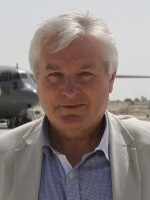MICHELE NORRIS, host:
From NPR News, this is ALL THINGS CONSIDERED. I'm Michele Norris.
MELISSA BLOCK, host:
And I'm Melissa Block.
In Afghanistan today, a suicide bomber attacked a funeral ceremony in the southern city of Kandahar. At least 20 people were killed and more than 40 wounded. The mourners had gathered to honor a slain Muslim cleric known for his opposition to the Taliban. Among those killed today was the police commander of Kabul, the Afghan capital.
NORRIS: NPR's Philip Reeves is in Kabul and joins us now.
Philip, take us through what happened in Kandahar.
PHILIP REEVES reporting:
Well, this was the funeral of a man who's considered by many as the most prominent Islamic cleric in Kandahar province. His name's Mulawi Abdullah Fayaz. He's a supporter of President Hamid Karzai and had recently been quite outspoken in his criticism of the Taliban, which is particularly strong in the Kandahar area and in southeastern Afghanistan, generally. Fayaz was assassinated on Sunday by militants who shot him outside his office. That attack was presumed to be carried out by the Taliban. And today, hundreds of people gathered at a mosque to honor him. A suicide bomber appeared and, according to some, he was dressed as a policeman and got into the mosque and detonated.
NORRIS: And the fact that this took place in a mosque, what's the reaction been?
REEVES: Well, it's certainly making headlines here. I mean, attacks on mosques are very rare in Afghanistan, unlike neighboring Pakistan where they've become the sort of forum for numerous sectarian attacks between the Sunnis and the Shia. Now several officials here have blamed this attack on a non-Afghan. How reliable their evidence is remains to be seen, but at least one official has said that the bomber was an Arab. Afghan's Interior Ministry has denounced the attack as an atrocity, and President Karzai has descried it as the act of what he called `defeated terrorists.'
NORRIS: Kandahar was at one point a stronghold of the Taliban. Is there a larger story here? Is there a resurgence of the Taliban or other Islamists?
REEVES: Well, it's difficult to say with any certainty. There's usually a spike of violence in Afghanistan after the winter. However, there have been a number of incidents, particularly in May--it was a very violent month: 11 Afghans, employees from an agricultural company, were shot and killed in Zabul province; a female Afghan TV presenter was shot. And so it is certainly harder for Washington generally and others to characterize the situation in Afghanistan right now as an out-and-out success.
NORRIS: With this uptick in violence, is there overall a change in the way people there view the government and the prospects for stability in the country?
REEVES: Well, the government of Hamid Karzai has suffered a blow in recent weeks largely because of the controversy that surrounded the news that the US interrogators at a base here in Afghanistan had been abusing prisoners and, more importantly, the allegations that the Koran was defiled by US interrogators at Guantanamo Bay. This placed President Karzai in a difficult position because obviously the US is a key ally and supporter of this country. And, indeed, he went to Washington with strong words, saying that he wanted, for example, to have far more influence over the decisions relating to the US military and to bring home prisoners in Guantanamo Bay. He came back, though, without having achieved that and has been criticized by that.
There are other claims, too, in this country that he is pursuing an excessively Pashtun or ethnically based policy. Those claims come from his critics, particularly among the Tajiks.
NORRIS: Philip, thanks for talking to us.
REEVES: You're welcome.
NORRIS: NPR's Philip Reeves in Kabul. Transcript provided by NPR, Copyright NPR.






